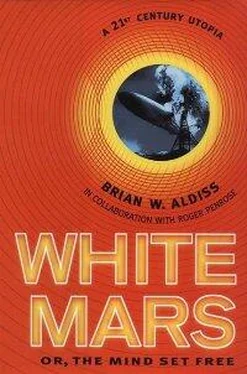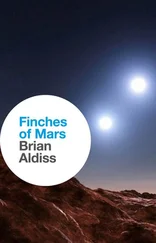Brian Aldiss - White Mars
Здесь есть возможность читать онлайн «Brian Aldiss - White Mars» весь текст электронной книги совершенно бесплатно (целиком полную версию без сокращений). В некоторых случаях можно слушать аудио, скачать через торрент в формате fb2 и присутствует краткое содержание. Год выпуска: 1999, ISBN: 1999, Издательство: Little, Brown UK, Жанр: Фантастика и фэнтези, на английском языке. Описание произведения, (предисловие) а так же отзывы посетителей доступны на портале библиотеки ЛибКат.
- Название:White Mars
- Автор:
- Издательство:Little, Brown UK
- Жанр:
- Год:1999
- ISBN:0-316-85243-0
- Рейтинг книги:5 / 5. Голосов: 1
-
Избранное:Добавить в избранное
- Отзывы:
-
Ваша оценка:
- 100
- 1
- 2
- 3
- 4
- 5
White Mars: краткое содержание, описание и аннотация
Предлагаем к чтению аннотацию, описание, краткое содержание или предисловие (зависит от того, что написал сам автор книги «White Mars»). Если вы не нашли необходимую информацию о книге — напишите в комментариях, мы постараемся отыскать её.
White Mars — читать онлайн бесплатно полную книгу (весь текст) целиком
Ниже представлен текст книги, разбитый по страницам. Система сохранения места последней прочитанной страницы, позволяет с удобством читать онлайн бесплатно книгу «White Mars», без необходимости каждый раз заново искать на чём Вы остановились. Поставьте закладку, и сможете в любой момент перейти на страницу, на которой закончили чтение.
Интервал:
Закладка:
Something in the tone of her voice stung Anstruther.
“No. Certainly not. So you’ve simply done what your mother told you all the years of your life! Did you never have any ideas of your own? What does your husband make of you being stuck here for seventy years, just grubbing in the soil?”
“Andy is my brother, master, if you refer to him. And we’ve been perfectly happy and harmed no one. Nor been impolite to anyone…”
We had regained the tiny paved area by the gate. We could smell the fragrance of the thyme, growing in the cracks between the paving stones, crushed underfoot. The two looked at each other in mutual distrust. Anstruther was a tall, solidly built man, who dominated the fragile little woman before him.
He saw she was angry. I feared he might destroy all her contentment with an expression of his irritation at her narrow-mindedness. He held the words back.
“Well, it’s a pretty garden you have,” he said. “Very pretty. I’m glad to have seen it.”
She was pleased by the compliment. “Perhaps there might be gardens like this on Mars one day,” she suggested, with a certain slyness.
“Not very likely.”
“Perhaps you would like some beans to take away with you?”
“I carry no money.”
“No, no, I mean as a gift. They might improve your temperament after all that factory food you eat.”
“Don’t be disgusting. Eat your beans yourself.”
He turned and gestured to me to open the gate. His two security men were waiting for him outside.
Anstruther’s jet took us to the UN building. Members of the United Nationalities rarely met in person. They conferred over the Ambient, and only on special occasions were they bodily present; this was such an occasion, when the future of the planet Mars was to be decided. For this reason, the United Nationalities building was small, and not particularly imposing, although in fact it was larger than it needed to be, to satisfy the egos of its members.
On my Ambient I called Legalassist on the third level and gained entry to their department while Anstruther fraternised with other delegates below.
A Euripides screened me various files on EUPACUS, the international consortium whose component nations—the European Union, the Pacific Rim nations, and the United States—all had a claim on Mars.
Flicking to a file on the legal history of Antarctica, I saw that a similar situation had once existed there. Twelve nations had all laid claim to a slice of the White Continent. In December 1959 representatives of these nations had drawn up an Antarctic Treaty, which came into effect in June 1961. The treaty represented a remarkable step forward for reason and international cooperation. Territorial disputes were suspended, all military activities banned, and the Antarctic became a Continent for Science.
I took print-outs of relevant details. They might prove useful in the forthcoming debate. What the twentieth century had managed, we could certainly better, and on a grander scale, in our century.
In the ground-floor reception rooms, I found my boss consorting with Korean, Japanese, Chinese and Malay diplomats, all members of interested Pacrim countries. Anstruther was improving his shining image. A great amount of smiling by activating the zygomatic muscle went on, as is customary during such encounters.
When the session gong sounded, I accompanied Anstruther into the Great Hall, where we took our assigned places. Once I was seated at a desk in the row behind him, I passed him the Legalassist prints. Unpredictable as ever, he barely glanced at them.
Today’s the time for oratory, not facts,” he said. His voice was remote. He was psyching himself up for the debate.
When all delegates were assembled and quiet prevailed in the hall, the General Secretary made his announcement: “This is the General Assembly of the United Nationalities, meeting on 23 June 2041, to determine the future status of Planet Mars.”
The first speaker was called.
Svetlana Yulichieva of Russia was eloquent. She said that the manned landing on Mars marked a new page, if not a new volume, in the history of mankind. All nationalities rejoiced in the success of the Mars mission, despite the tragic loss of their captain. The way of the future was now clear. More landings must be financed, and preparations be made to terraform Mars, so that it could be properly colonised and used as a base for further exploration of the outer solar system. She suggested that Mars come under UN jurisdiction.
The Latvian delegate was eloquent. He agreed with Yulichieva’s sentiments and said that the space-going nations must be congratulated on the enterprise they had shown. The loss of Captain Tracy was regretted, but must not be allowed to impede further progress. Was not, he asked rhetorically, the opening-up of a new world part of a human dream, the dream of going forth to conquer space, as envisioned in many fictions, book and film, in which mankind went forward boldly, overcoming everything hostile which stood in its way, occupying planet after planet? The beginning of the eventual encompassing of the galaxy had begun. The terraforming of Mars must assume top priority.
The Argentinian delegate, Maria Porua, begged to disagree. She spoke at length of the hideous costs of an enterprise such as terraforming, the success of which was not guaranteed. Recent disappointments, such as the failure of the hypercollider on the Moon—the brainchild of a Nobel Prize winner—must act as a caution. There were terrestrial problems enough, on which the enormous investments required for any extraterrestrial adventure could more profitably be spent.
Tobias Bengtson, the delegate for Sweden, scorned the last speaker’s response to a magnificent leap into an expanding future. He reminded the assembly of the words of Konstantin Tsiolkovsky, the great Russian aeronautical engineer, who had said that Earth was the cradle of mankind, but that mankind could not remain for ever in the cradle. “This great nineteenth-century visionary woke up the human race to its destiny in space. The dream has grown more real, more accurate, more pressing, as the years have progressed. A glorious prospect must not be allowed to slip away. A few deaths, a little expense, along the way must not deflect the nationalities from achieving our destiny, the conquest of all solar space, from the planet Mercury right out to the heliopause. Only then will the dreams of our forefathers—and our mothers—be fulfilled.”
Other speakers rose, many arguing that terraforming was a necessity. Why go to Mars if not to create more living space? Some warned that Mars would become a United States dependency, others that a ruling was required, otherwise competing nations would use Mars not as living space, but as a battlefield.
“I am going to talk practicalities,” said a delegate from the Netherlands. “I have listened to a lot of airy-fairy talk here today. The reality is that we have now acquired this entire little planet of waste land. What are we to do with it? It’s no good for anything.” He thumped the desk for emphasis. “Who’d want to live there? You can’t grow anything on it. But we can dump our dangerous nuclear waste on Mars. It would be safe there. You can build a mountain of waste by one of the poles—it might even make the place look a bit more interesting.”
It was Leo Anstruther’s turn to speak. The antagonism generated against the previous delegate’s speech gave him the opportunity to put his argument forward. He walked deliberately to the rostrum, where he scrutinised the assembly before speaking.
“Do you have to act out the dreams of your mothers and fathers?” he asked. “If we had always done so, would we not still be sitting in a jungle in the middle of Africa, going in fear of the tribe in the next tree? EUPACUS—and not simply NASA—has achieved a great feat of organisation and engineering, for which we sincerely congratulate them. But this arrival of a crew of men and women on the Red Planet must have nothing to do with conquest. Nor should we turn the place into a rubbish dump. Have we lost our reverence for the universe about us?”
Читать дальшеИнтервал:
Закладка:
Похожие книги на «White Mars»
Представляем Вашему вниманию похожие книги на «White Mars» списком для выбора. Мы отобрали схожую по названию и смыслу литературу в надежде предоставить читателям больше вариантов отыскать новые, интересные, ещё непрочитанные произведения.
Обсуждение, отзывы о книге «White Mars» и просто собственные мнения читателей. Оставьте ваши комментарии, напишите, что Вы думаете о произведении, его смысле или главных героях. Укажите что конкретно понравилось, а что нет, и почему Вы так считаете.










